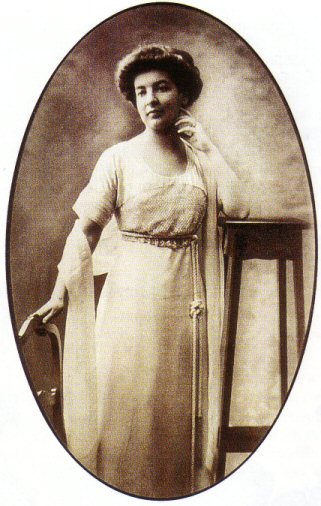Dora Pejačević
(10 September 1885 – 5 March 1923)
Croatian composer, a member of the Pejačević noble family. She was one of the composers to introduce the orchestral song to Croatian music.
Piano Trio in C, Op. 29
I. Allegro con moto [0:00]
II. Scherzo: Allegro [11:14]
III. Lento - Allegretto [17:17]
IV. Finale: Allegro risoluto [26:00]
A charming, lyrical work for violin, cello and piano by the late Romantic Croatian composer Dora Pejačević (1885-1923), a member of the Pejačević noble family and the first major female composer from her country. Her Symphony in F sharp minor and Phantasie concertante for piano and orchestra are posted on
the "musicanth" channel:
Piano Quartet in D minor, Op. 25
Piano Quartet in D minor, Op. 25, written in 1908.
00:00 - I. Allegro ma non tanto
07:47 - II. Andante con moto
12:27 - III. Allegretto grazioso
16:47 - IV. Allegro comodo
The Piano Quartet in D minor, Op. 25, was written when Pejačević was only 23 years old, but it is clearly the work of a mature composer. The piece is primarily written in the late Romantic style although there are a few adventurous tonal episodes.
- The Quartet begins with a very appealing Allegro, at times quite chromatic.
- It is followed by a lyrical Adagio, the main theme to which, though simple, is quite warm and winning.
- The third movement is marked Menuetto, allegretto, and is an interesting blend of of the Romantic and classic, a cross between a romantic intermezzo and a playful modern and updated minuet.
- The finale, Rondo, is a spirited, carefree dance with highly effective use of pizzicato.
This is a first rate late romantic work which is certain to be a success in the concert hall but can also be recommended to amateurs.
Dora Pejačević (in old documents also Pejacsevich) was born in Budapest, a daughter of Croatian ban Teodor Pejačević and Hungarian Countess Lilla Vay de Vaya, herself a fine pianist. Her mother gave her first piano lessons. Paternally, she descended from the old Croatian noble Pejačević family, one of the most distinguished noble families in Slavonia, eastern region of Croatia.
Dora began to compose when she was 12. She studied music privately in Zagreb, Dresden and Munich and received lessons in instrumentation (from Dragutin Kaiser and Walter Courvoisier), composition (from Percy Sherwood) and violin (from Henri Petri in München). She was largely self-taught, however. She married Ottomar von Lumbe in 1921. Although Pejačević led a lonely life, she met many prominent musicians and writers, and befriended Austrian journalist and writer Karl Kraus and Czech aristocrat and patroness of arts Sidonie Nádherná. Dora died in Munich in 1923, a result of complications following a difficult childbirth (of her son Theo), and is buried at the cemetery in Našice, Croatia.
Dora Pejačević should be considered a major Croatian composer. She left behind a considerable catalogue of 58 opuses (106 compositions), mostly in late-Romantic style, including songs, piano works, chamber music, and several compositions for large orchestra, arguably her best. Her Symphony in F-sharp minor is considered by scholars the first modern symphony in Croatian music. Most of her music has yet to be published and released on compact disc, although concerted efforts have been made recently to rectify this situation. For example, the Croatian Music Information Centre has published some of her scores, including three of her orchestral works (Piano Concerto, Symphony, and Phantasie Concertante). In 2008, the Center also published a bilingual monograph (in English and Croatian), written by the Pejačević scholar Koraljka Kos, accompanied by a first all-Pejačević CD of piano and chamber music.
Her life is a subject of a Croatian biographical film Countess Dora (1993), directed by Zvonimir Berković and starring Alma Prica and Rade Šerbedžija.[2]
'♣ 음악 감상실 ♣ > - 클래식(전곡)' 카테고리의 다른 글
| Nicolas-Charles Bochsa - Nocture en sol mineur (0) | 2016.08.11 |
|---|---|
| Max Reger - Violin Concerto in A-major, Op.101 (1908) (0) | 2016.08.07 |
| Carl Joseph Toeschi - Violin Concerto in D major (0) | 2016.08.01 |
| Joachim Raff - Symphony No. 7 "In the Alps" (1875) (0) | 2016.07.28 |
| Federigo Fiorillo - Violin Concerto No. 1 in F major (0) | 2016.07.22 |
